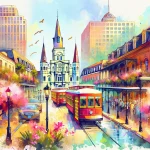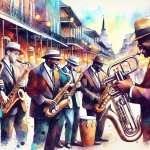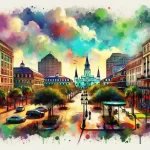New Orleans resonates with the captivating rhythms of live music, where the streets echo with the soulful melodies of jazz, blues, and funk. This cultural hub has long been a magnet for music enthusiasts, offering an unparalleled experience of immersing oneself in the melodic tapestry that permeates every corner of the city.
In This Article
TL;DR
- New Orleans holds a renowned reputation as a hub for live music, particularly jazz, which originated and evolved within the city’s diverse cultural landscape.
- Live music venues play a vital role in preserving and promoting the city’s cultural heritage, serving as guardians of its musical traditions.
- This article explores current, popular venues that are central to the live music scene, offering a unique and authentic experience for visitors and locals alike.
Historical Context of Music in New Orleans
The origins of jazz can be traced back to the late 19th century in New Orleans, where a unique blend of African and European musical traditions gave birth to this iconic art form. The city’s melting pot of cultures, including African, French, Spanish, and Caribbean influences, created a fertile ground for musical innovation and experimentation.
Live music venues have played a pivotal role in the development of New Orleans’ music culture, providing a stage for legendary artists and fostering the growth of new talent. From the early days of jazz in the French Quarter to the resurgence of the music scene after Hurricane Katrina, these venues have been the heartbeat of the city’s musical identity.
Iconic Live Music Venues in New Orleans
Preservation Hall
Situated in the French Quarter, Preservation Hall is a living monument to the rich history of New Orleans jazz. Established in 1961, this intimate venue has hosted countless legendary performers, preserving the authentic sound and spirit of traditional jazz for generations. With its weathered walls and candlelit ambiance, Preservation Hall transports visitors back in time, offering an unforgettable experience that captures the essence of New Orleans’ musical heritage.
Tipitina’s
Originally a neighborhood juke joint, Tipitina’s has evolved into a beloved music landmark that attracts both local and national acts. Named after a song by the iconic New Orleans pianist Professor Longhair, this venue has been a staple of the city’s music scene since 1977. With its lively atmosphere and commitment to showcasing a diverse range of musical genres, Tipitina’s embodies the spirit of New Orleans’ vibrant and eclectic music culture.
The Maple Leaf Bar
Established in 1974, the Maple Leaf Bar has been a staple for local musicians and music lovers alike. This lively watering hole, located in the Uptown neighborhood, has hosted live acts for decades and is renowned for its intimate and energetic atmosphere. Adjacent to the renowned Jacques-Imo’s restaurant, the Maple Leaf Bar offers a perfect night out, combining exceptional music with delectable Creole cuisine.
Emerging Venues and Modern Influences
While New Orleans is deeply rooted in its musical traditions, the city’s live music scene is constantly evolving, with new venues shaping the contemporary landscape. These venues embrace a fusion of old and new, blending traditional styles with contemporary influences and attracting a diverse audience.
One such venue is Chickie Wah Wah, an unassuming white brick cottage on Canal Street that offers a constant lineup of great musical acts and a relaxed atmosphere. From singer-songwriters to country, rock, and local Cajun music, Chickie Wah Wah celebrates the city’s musical diversity while providing an intimate listening experience.
Another notable venue is Le Bon Temps Roule on Magazine Street, a dive bar with a live music room in the back. Known for its hearty pub menu, Bloody Marys, and a vast array of acts ranging from soul to hip-hop DJ sets, Le Bon Temps Roule exemplifies the city’s ability to seamlessly blend traditional and modern musical influences.
Architectural and Acoustic Design of Venues
New Orleans’ live music venues are not only cultural landmarks but also architectural marvels, with unique design elements that enhance the musical experience. From the weathered walls and candlelit ambiance of Preservation Hall to the modern acoustics of newer venues, each space has been carefully crafted to create an immersive and unforgettable atmosphere.
The architectural design of these venues often incorporates elements that improve acoustics, such as high ceilings, strategically placed sound-absorbing materials, and thoughtful stage placement. This attention to detail ensures that every note resonates with clarity and depth, allowing the music to truly come alive.
Cultural Impact of Live Music Venues
Live music venues in New Orleans are more than just entertainment hubs; they are cultural institutions that play a vital role in community engagement and cultural preservation. These venues serve as gathering places where locals and visitors alike can connect with the city’s rich musical heritage, fostering a sense of pride and belonging.
Moreover, live music venues contribute significantly to the local economy through tourism and nightlife. Visitors from around the world flock to New Orleans to experience its legendary music scene, supporting local businesses and contributing to the city’s vibrant cultural landscape.
Beyond their economic impact, these venues serve as cultural landmarks, educating and inspiring future generations of musicians and music enthusiasts. They offer a window into the city’s storied past while paving the way for new artistic expressions and cultural traditions to emerge.
Experiencing Live Music in New Orleans: A Visitor’s Guide
To fully immerse yourself in the live music experience in New Orleans, it’s essential to plan your visit strategically. The city’s music scene is at its liveliest during festivals and special events, such as the New Orleans Jazz & Heritage Festival and the French Quarter Festival. These celebrations offer a variety of performances, allowing you to sample various musical genres and discover new artists.
When choosing a venue, consider your musical preferences and the atmosphere you desire. For a traditional jazz experience, Preservation Hall and the Palm Court Jazz Cafe are excellent choices. If you’re seeking a more eclectic mix of genres, Frenchmen Street and the Marigny neighborhood are renowned for their vibrant music scene, with venues like The Spotted Cat Music Club and d.b.a. offering a diverse lineup of performers.
It’s also important to familiarize yourself with the etiquette of live music venues in New Orleans. Many establishments have a “no talking” policy during performances, allowing the music to take center stage. Additionally, tipping the musicians is not only appreciated but also a longstanding tradition in the city’s music culture.
Future of Live Music in New Orleans
As New Orleans continues to evolve, so too does its live music scene. Trends and future directions in this vibrant landscape include the integration of technology, such as live-streaming performances and immersive audio-visual experiences, as well as a growing emphasis on sustainability practices within venues.
While the city’s music venues face challenges, including economic pressures and changing musical tastes, their resilience and adaptability have been proven time and again. By embracing innovation while honoring their rich cultural heritage, these venues will continue to thrive, ensuring that the soul of New Orleans’ music remains alive and vibrant for generations to come.






